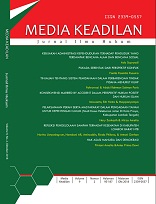IMPLIKASI YURIDIS PUTUSAN MAHKAMAH KONSTITUSI NOMOR 91/PUU-XVIII/2020 TERHADAP KEDUDUKAN UU NO. 11 TAHUN 2020 TENTANG CIPTA KERJA
DOI:
https://doi.org/10.31764/jmk.v14i1.12200Keywords:
Applicability, Conditional Unconstitutional, Job Creation LawAbstract
Constitutional Court Decision Number: 91/PUU-XVIII/2020 which granted the formal test of Law Number 11 of 2020 concerning Job Creation. In fact, the Judge's Decision is intended to end disputes and differences in interpretation of a provision. However, this Decis on actually creates dualism regarding the applicability of the Job Creation Law, because on the one hand this Law is declared unconstitutional, but on the other hand this Law remains in effect and has binding legal force. This juridical issue will be examined using normative legal research imethods. From ithe results of the research, it was concluded that the meaning of conditional unconstitutional in this Decision is the establishment of Law no. 11 of i2020 icontradicts the 1945 Constitution or is conditionally (temporary) unconstitutional. This temporary unconstitutional status depends on conditions in the form of an obligation for legislators to make improvements to the formation of Law no. 11 of 2020 for ia period of 2 (two) years. As for the 2 (two) year period, the Job Creation Law will still apply based on points '4' iand '6' in the ruling.References
Buku
Asshidique J. (2020). Omnibus Law dan Penerapannya di Indonesia. Konstitusi Press. Hlm. 22
Redi A. (2020). Hukum Pembentukan Peraturan Perundang-Undangan. Sinar Grafika. Hlm. 29
JURNAL
Asep, B. H. (2020). Pandangan Tentang Apakah Politik Hukum iItu?.Selisik, 6(1)
Candranegara, I. S. (2020). Metode Omnibus Law: Doktin, Praktik dan Persoalan yang Masih tersisa. Webinar IMM Justitia Fakultas iHukum iUniversitas iMuhammadiyah iJember.
Fitryantica, A. (2019). Harmonisasi Peraturan Perundang-Undangan Indonesia Melalui Konsep Omnibus Law. Jurnal Gema Keadilan, 6(3).
Frebiayansyah, F.I. (2016). Konsep Pembentukan Peraturan Perundang-Undangan di Indonesia. Perspektif, 21(3)
Harjono, D.K. (2020). Konsep Omnibus Law Ditinjau Dari UndangUndang Nomor 12 Tahun 2011 ientang Pembentukan Peraturan Perundang-Undangan. Jurnal Hukum: Hukum Untuk Mengatur dan Melindungi Masyarakat Fakultas Hukum Universitas Kristen Indonesia, 6(2)
Noer, K.E. (2019). Urgensi Omnibus Law Dalam Percepatan Reformasi Regulasi Dalam Perspektif iHukum Progresif. Jurnal Penelitian Hukum De Jure, 20(2)
Downloads
Published
Issue
Section
License

Media Keadilan: Jurnal Ilmu Hukum is licensed under the Creative Commons Attribution-ShareAlike 4.0 International License.
Copyright articles published in Media Keadilan: Jurnal Ilmu Hukum is the author's right without limitation.

